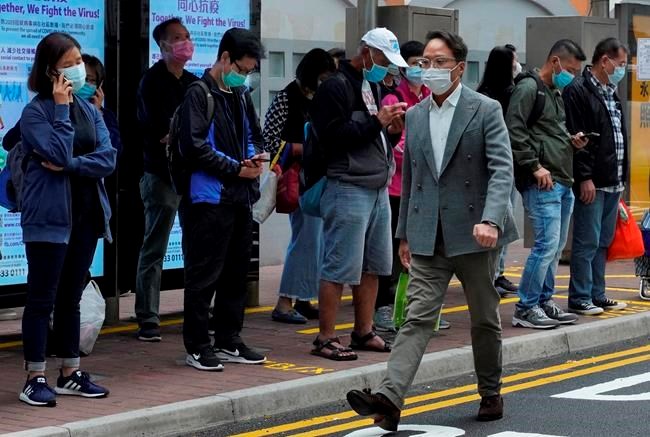OTTAWA — Karen Grepin's family arrived in Hong Kong six months ago to start a grand adventure in a new country after she took a job as a professor of public health at the University of Hong Kong.
They have now spent almost half their time there living under the cloud of the COVID-19 outbreak. It has kept her kids out of school for almost two months and required Grepin to move all her classes online.
"It's been like the worst possible six months," said Grepin, whose job as a researcher has included work on the virus.
In November, Hong Kong schools were closed amid escalating violence between police and anti-government protesters. Grepin's two children, ages seven and nine, missed a week of school. Some universities were closed for a month.
Early in 2020, those tensions had faded a little. Then the news of a novel coronavirus spreading in China's Hubei province began to hit. By the time Hong Kong was ready to celebrate the Chinese New Year Jan. 25, the city had its first confirmed cases and the government ordered all the schools to close again.
At first it was to be just until Feb. 17. A week into the closure, that was extended until March 2. Later it was extended until April 20, though Carrie Lam, the chief executive of Hong Kong, said this week it's unlikely now the schools will reopen then.
A second wave of COVID-19 cases is emerging in Hong Kong, mainly from travellers, as the virus has exploded in other parts of the world, particularly Europe and North America.
"In the last two weeks things had almost started to go back to normal," Grepin said. "People were getting out again, you'd see lines for the bus. That's changing again. What's happening now this week is rattling people again."
As of Thursday, there were 208 confirmed cases in Hong Kong, 70 of them diagnosed since March 5. More than half the March cases were diagnosed in recent travellers. Four people have died.
The government is now requiring all travellers arriving to quarantine for 14 days, and is insisting on electronic monitoring bracelets to ensure they comply.
Hong Kong's tracking of its COVID-19 cases is extremely detailed. Its website lists every single positive or suspected case including the patient's age, sex and the building he or she lives in to warn others nearby that it is in their midst. You can see when the patient was diagnosed, when symptoms began, whether the person contracted it outside or inside Hong Kong, and which hospital he or she is in.
For those forced into quarantine because of travel, it says what buildings they are in and how long they are required to be isolated. Hospitals all list wait times for being assessed.
Hong Kong, a special administrative region of China, is a densely populated place where social distancing can be difficult. Pressure from health workers to ramp up the fight, and memories of the SARS outbreak in 2003, prompted swift action from the government. It barred entry to anyone coming from Hubei province in mainland China, where the virus was first rampant, and required all visitors from elsewhere in China to quarantine for two weeks after arriving in Hong Kong before extending that demand more widely.
But Hong Kong residents, Grepin notes, also demanded more from each other, expecting everyone to wear facemasks in public for example. While the Hong Kong government, much like those in Europe and North America, urged people to leave the hard-to-find masks for health workers and people who are actually sick, residents in Hong Kong ignored the advice.
"If you were on the streets and you weren't wearing a face mask, or especially if you were in a cab, they would say, 'Put on a face mask, I've got kids,' " said Charles McDermid, a journalist with the South China Morning Post in Hong Kong.
Grepin said the first couple of weeks in the city saw panic buying that stripped grocery shelves of staples like rice and soap, but that ended quickly. Now you can get most things easily again — except for masks.
While the government never forced the closure of restaurants or bars many closed on their own when business plummeted as people stayed home. Playgrounds are mostly deserted. People are going to work when they can or have to but maintain distance. McDermid said there are still people around but compared to normal days, Hong Kong is like a "ghost town."
Grepin said her family has a few friends they trust and know where they have been, and have overcome the social isolation by going to the beach or hiking with them. While schooling obligations at home were lax at first, as the closure dragged on more resources were provided and now her kids are in a new routine, doing work in the morning and afternoon, with a mid-day break. In the evening they socialize with friends on Zoom.
In fact, Grepin said, her son had his first online "playground fight" with a peer on Zoom this week.
"Someone was muting someone else, turning up someone else's volume, and it turned into a big fiasco," she said.
Grepin's university students will complete the entire second term online, which she said some of them enjoy but others find difficult. Hong Kong residents mostly live in small apartments, and Grepin said she had a recent videoconference with a student sitting on a toilet because the bathroom was the only quiet place the student could find.
McDermid said the economy of Hong Kong is suffering, and an "emotional fatigue" is setting in as the reality that a second wave of the virus is hitting sets in.
"It is really tense and nervous and anxious," he said. "It's all anybody talks about. I can't think of a more consuming story ever."
This report by The Canadian Press was first published March 19, 2020.
Mia Rabson, The Canadian Press




